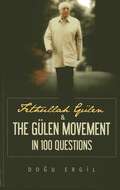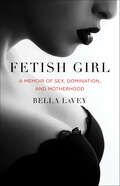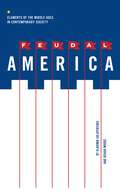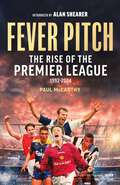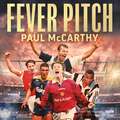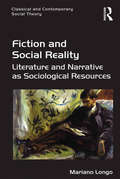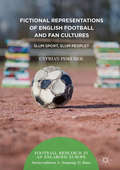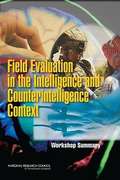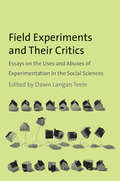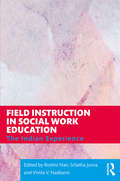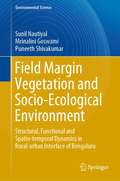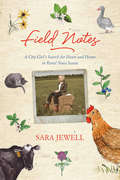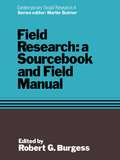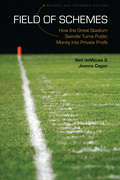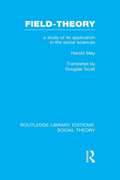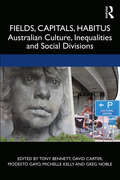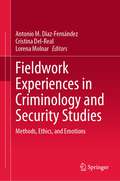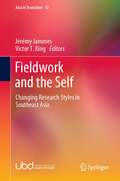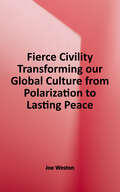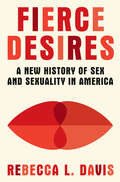- Table View
- List View
Fethullah Gulen and the Gulen Movement in 100 Questions
by Dogu ErgilUnderstanding both Fethullah Gulen, a moderate Turkish Muslim scholar, and the Gulen Movement, a global network of volunteers, teachers, students, intellectuals and business people who are inspired by Gulen's philosophy based on dialog and peaceful coexistence, is vital to making any sort of predictions about the direction that Turkey might be headed in the next years. Who is Fethullah Gulen? What is Gulen;s worldview and what are his fundamental ideas about society and the state. How does Gulen view history and what does he consider the most important events? What are the basic principles of the Gulen movement? These questions and more are posed ans answered in detail in this book.,
Fethullah Gülen’s Teaching and Practice: Inheritance, Context, and Interactive Development
by Paul WellerThis is the first book of its kind about the Turkish Muslim scholar, Fethullah Gülen, since the July 2016 events in Turkey, the trauma experienced by Gülen, and the disruption to initiatives inspired by his teaching, known as Hizmet. Drawing on primary interviews with Gülen and Hizmet participants and a literature review, this Open Access book locates the clear origins of Gülen’s teaching in the Qur’an and Sunnah in dynamic engagement with their geographical, temporal and existential reception, translation, and onward communication. It argues that as Hizmet cannot be understood apart from Gülen and his teaching, Gülen and his teaching cannot be understood apart from Hizmet, while exploring the heritage of both. A more geographically focused case study is set out in author Paul Weller’s Hizmet in Transitions: European Developments of a Turkish Muslim-Inspired Movement, also published by Palgrave Macmillan (2022).
Fetish Girl: A Memoir of Sex, Domination, and Motherhood
by Bella LaVeyFetish Girl is a provocative, dark, and erotic memoir that tells it like it is. LaVey pulls readers into her evolving journey: dancer to stripper to dominatrix to erotic wrestler to BDSM aficionado—and all of this while being a single mother trying to do right by her son. This true story doesn’t hold back from diving into these subcultures with a keen eye for the kinky, for the sexy, for the power of taking a risk. “Fans of the Fifty Shades series will undoubtedly find much to savor in this ribald, risqué, and captivating remembrance.” —Kirkus Review
Feudal America: Elements of the Middle Ages in Contemporary Society
by Vladimir Shlapentokh Joshua WoodsDo Americans live in a liberal capitalist society, where evenhanded competition rules the day, or a society in which big money, private security, and personal relations determine key social outcomes? Vladimir Shlapentokh and Joshua Woods argue that the answer to these questions cannot be found among the conventional models used to describe the nation. Offering a new analytical tool, the authors present a provocative explanation of the nature of contemporary society by comparing its essential characteristics to those of medieval European societies. Their feudal model emphasizes five elements: the weakness of the state and its inability to protect its territory, guarantee the security of its citizens, and enforce laws; conflicts and collusions between and within organizations that involve corruption and other forms of illegal or semilegal actions; the dominance of personal relations in political and economic life; the prevalence of an elitist ideology; and the use of private agents and organizations for the provision of safety and security. Feudal America urges readers to suspend their forward-thinking and futurist orientations, question linear notions of social and historical progression, and look for explanations of contemporary social problems in medieval European history.
Fever Pitch: The Rise of the Premier League 1992-2004
by Paul McCarthyTHE INCREDIBLE FIRST 12 YEARS OF THE PREMIER LEAGUE AS TOLD BY THE LEGENDS WHO WERE THERE'I met Jack Nicholson and when a Hollywood superstar asks about Manchester United, you realise how big the Premier League is around the world'David BeckhamBased on the acclaimed BBC Series, with a foreword by Alan ShearerThe Premier League is the most watched sports league in the world, broadcast into 188 countries and watched by 3.2 billion people worldwide. It revolutionised football, transforming the beautiful game into a multi-billion-pound business and making its biggest stars millionaires.Fever Pitch tells the inside story of the formation of the league, from the early discussions with Rupert Murdoch about how Sky could be at the heart of this new league, to the bitter rivalries and radical new managers who changed the face of football forever.With insight from football's biggest names, this is the inside track on the Premier League as you've never heard it before. From David Beckham to Eric Cantona, Peter Schmeichel to Gary Neville, this book is full of exclusive interviews that give fascinating insight into the biggest sports league in the world from the people who made it happen.'The recognition our game gets is astonishing and the love of the Premier League is undeniable'Alan Shearer'England is special. It is more than football, it is like the players are rock stars'Eric Cantona'It's what it should be about - enthralling, exciting, magic, taking risks, playing attacking football'Gary Neville
Fever Pitch: The Rise of the Premier League 1992-2004
by Paul McCarthyTHE INCREDIBLE FIRST 12 YEARS OF THE PREMIER LEAGUE AS TOLD BY THE LEGENDS WHO WERE THERE'I met Jack Nicholson and when a Hollywood superstar asks about Manchester United, you realise how big the Premier League is around the world'David BeckhamBased on the acclaimed BBC Series, with a foreword by Alan ShearerThe Premier League is the most watched sports league in the world, broadcast into 188 countries and watched by 3.2 billion people worldwide. It revolutionised football, transforming the beautiful game into a multi-billion-pound business and making its biggest stars millionaires.Fever Pitch tells the inside story of the formation of the league, from the early discussions with Rupert Murdoch about how Sky could be at the heart of this new league, to the bitter rivalries and radical new managers who changed the face of football forever.With insight from football's biggest names, this is the inside track on the Premier League as you've never heard it before. From David Beckham to Eric Cantona, Peter Schmeichel to Gary Neville, this book is full of exclusive interviews that give fascinating insight into the biggest sports league in the world from the people who made it happen.'The recognition our game gets is astonishing and the love of the Premier League is undeniable'Alan Shearer'England is special. It is more than football, it is like the players are rock stars'Eric Cantona'It's what it should be about - enthralling, exciting, magic, taking risks, playing attacking football'Gary Neville
Fever Pitch: The Rise of the Premier League 1992-2004
by Paul McCarthyTHE INCREDIBLE FIRST 12 YEARS OF THE PREMIER LEAGUE AS TOLD BY THE LEGENDS WHO WERE THERE'I met Jack Nicholson and when a Hollywood superstar asks about Manchester United, you realise how big the Premier League is around the world'David BeckhamBased on the acclaimed BBC Series, with a foreword by Alan ShearerThe Premier League is the most watched sports league in the world, broadcast into 188 countries and watched by 3.2 billion people worldwide. It revolutionised football, transforming the beautiful game into a multi-billion-pound business and making its biggest stars millionaires.Fever Pitch tells the inside story of the formation of the league, from the early discussions with Rupert Murdoch about how Sky could be at the heart of this new league, to the bitter rivalries and radical new managers who changed the face of football forever.With insight from football's biggest names, this is the inside track on the Premier League as you've never heard it before. From David Beckham to Eric Cantona, Peter Schmeichel to Gary Neville, this book is full of exclusive interviews that give fascinating insight into the biggest sports league in the world from the people who made it happen.'The recognition our game gets is astonishing and the love of the Premier League is undeniable'Alan Shearer'England is special. It is more than football, it is like the players are rock stars'Eric Cantona'It's what it should be about - enthralling, exciting, magic, taking risks, playing attacking football'Gary Neville
Few Call It War: Religious Terrorism: Then and Now
by Robert Michael Hicks&“A highly readable and well-documented account of the use and abuse of religion for violent political ends . . . This is a book well worth reading&” (Timothy J. Demy, ThD, PhD, coauthor of In the Name of God). Most Americans could not fathom how Islamic terrorists could bring down the World Trade Center or an army psychiatrist could turn on his own soldiers, taking their lives in the name of his religion. How could an ex-army veteran blow up a federal building, or a Jewish doctor gun down Muslims at worship? None of these incidents fit our conceptions of the benevolence of religion. More importantly, is there something inherent within religions that justifies the taking of human lives? In Few Call It War, Dr. Robert Hicks explores these questions and takes the blinders off illuminating the roots of religious violence, what religious terrorists have in common, and how they differ. As Hicks points out, all major religions have used violence and terrorist methodologies at some points in their histories. Few Call It War reveals how the teachings of religious founders and the sacred writings attributed to them provide rich soil from which contemporary religious clerics and ideologues gain converts. If one is interested in gaining an answer to the question, &“Of all the religions in the world, which are most prone to using violence?&” Few Call It War provides a well-reasoned answer that is well worth the read. &“A masterpiece in the study of religiously motivated terrorism. He has been fair in his critique of all religions, including movements within Judaism and even Christianity.&” —Robert L. Brennemann, PhD, professor, Intercultural Studies, North Central University
Fiction and Social Reality: Literature and Narrative as Sociological Resources (Classical and Contemporary Social Theory)
by Mariano LongoIn spite of their differing rhetorics and cognitive strategies, sociology and literature are often concerned with the same objects: social relationships, action, motivation, social constraints and relationships, for example. As such, sociologists have always been fascinated with fictional literature. This book reinvigorates the debate surrounding the utility of fiction as a sociological resource, examining the distinction between the two forms of writing and exploring the views of early sociologists on the suitability of subjecting literary sources to sociological analysis. Engaging with contemporary debates in this field, the author explores the potential sociological use of literary fiction, considering the role of literature as the exemplification of sociological concepts, a non-technical confirmation of theoretical insights, and a form of empirical material used to confirm a set of theoretically oriented assumptions. A fascinating exploration of the means by which the sociological eye can be sharpened by engagement with literary sources, Fiction and Social Reality offers a set of methodological principles according to which literature can be examined sociologically. As such, it will appeal to scholars of sociology and literary studies with interests in research methods and interdisciplinary approaches to scholarly research.
Fictional Representations of English Football and Fan Cultures: Slum Sport, Slum People? (Football Research in an Enlarged Europe)
by Cyprian PiskurekThis book explores how recent football fiction has negotiated the decisive political developments in English football after the 1989/90 publication of the 'Taylor Report'. A direct response to the 1989 Hillsborough Disaster and growing concerns of hooliganism, the 'Taylor Report' suggested a number of measures for stricter regulation of fan crowds. In consequence, stadiums in the top divisions were turned into all-seated venues and were put under CCTV surveillance. The implementation of these measures reduced violent incidents drastically, but it also led to an unparalleled increase in ticket prices, which in turn significantly altered the demographics of the crowd. This development, which also enabled football's entry into other mainstream cultural forms, changed the game decisively. Piskurek traces patterns across prose and film to detect how these fictions have responded to the changed circumstances of post-Taylor football. Lending a cultural lens to these political changes, this book is pioneering in its analysis of football fiction as a whole, offering a fresh perspective to a range of scholars and students interested in cultural studies, sociology, leisure and politics.
Fictive Kinship: Family Reunification and the Meaning of Race and Nation in American Migration
by Catherine LeeToday, roughly 70 percent of all visas for legal immigration are reserved for family members of permanent residents or American citizens. Family reunification—policies that seek to preserve family unity during or following migration—is a central pillar of current immigration law, but it has existed in some form in American statutes since at least the mid-nineteenth century. In Fictive Kinship, sociologist Catherine Lee delves into the fascinating history of family reunification to examine how and why our conceptions of family have shaped immigration, the meaning of race, and the way we see ourselves as a country. Drawing from a rich set of archival sources, Fictive Kinship shows that even the most draconian anti-immigrant laws, such as the Chinese Exclusion Act of 1882, contained provisions for family unity, albeit for a limited class of immigrants. Arguments for uniting families separated by World War II and the Korean War also shaped immigration debates and the policies that led to the landmark 1965 Immigration Act. Lee argues that debating the contours of family offers a ready set of symbols and meanings to frame national identity and to define who counts as “one of us.” Talk about family, however, does not inevitably lead to more liberal immigration policies. Welfare reform in the 1990s, for example, placed limits on benefits for immigrant families, and recent debates over the children of undocumented immigrants fanned petitions to rescind birthright citizenship. Fictive Kinship shows that the centrality of family unity in the immigration discourse often limits the discussion about the goals, functions and roles of immigration and prevents a broader definition of American identity. Too often, studies of immigration policy focus on individuals or particular ethnic or racial groups. With its original and wide-ranging inquiry, Fictive Kinship shifts the analysis in immigration studies toward the family, a largely unrecognized but critical component in the regulation of immigrants’ experience in America.
Field Evaluation in the Intelligence and Counterintelligence Context: Workshop Summary
by National Research Council of the National AcademiesOn September 22-23, 2009, the National Research Council held a workshop on the field evaluation of behavioral and cognitive sciences--based methods and tools for use in the areas of intelligence and counterintelligence. Broadly speaking, the purpose of the workshop was to discuss the best ways to take methods and tools from behavioral science and apply them to work in intelligence operations. More specifically, the workshop focused on the issue of field evaluation--the testing of these methods and tools in the context in which they will be used in order to determine if they are effective in real-world settings. This book is a summary and synthesis of the two days of presentations and discussions that took place during the workshop. The workshop participants included invited speakers and experts from a number of areas related to the behavioral sciences and the intelligence community. The discussions covered such ground as the obstacles to field evaluation of behavioral science tools and methods, the importance of field evaluation, and various lessons learned from experience with field evaluation in other areas.
Field Experiments and Their Critics
by Dawn Langan TeeleIn recent years, social scientists have engaged in a deep debate over the methods appropriate to their research. Their long reliance on passive observational collection of information has been challenged by proponents of experimental methods designed to precisely infer causal effects through active intervention in the social world. Some scholars claim that field experiments represent a new gold standard and the best way forward, while others insist that these methods carry inherent inconsistencies, limitations, or ethical dilemmas that observational approaches do not. This unique collection of essays by the most influential figures on every side of this debate reveals its most important stakes and will provide useful guidance to students and scholars in many disciplines.
Field Instruction in Social Work Education: A Guide to Research in India
by Roshni Nair Srilatha Juvva Vimla V. NadkarniA comprehensive guide to social work praxis, this book provides a clear conceptual understanding of fieldwork supervision in India. It elaborates on the dynamic components of fieldwork instruction – the methodologies and effective strategies, the supervisor–student–agency triad, challenges and the future. The volume underlines the importance of student mentoring and the imperative need to develop creative and competent strategies to make fieldwork education more responsive and effective. It also emphasises the need for the inclusion of social justice-oriented perspectives and approaches in fieldwork training in India. Instructive and anecdotal, the chapters in this volume reflect on the challenges which students and supervisors face on a regular basis in different environments while dealing with critical circumstances. The focus of the book is to delineate strategies and approaches which promote skill building and the ability in students to understand sociocultural contexts of the field and engage with them effectively. This volume will be an essential resource for social work educators, field practitioners and students of social work, law, public policy, sociology and social entrepreneurship.
Field Margin Vegetation and Socio-Ecological Environment: Structural, Functional and Spatio-temporal Dynamics in Rural-urban Interface of Bengaluru (Environmental Science and Engineering)
by Sunil Nautiyal Mrinalini Goswami Puneeth ShivakumarThis book has been produced as a part of the project ‘Social-Ecological Systems at the Indian Rural-Urban Interface: Functions, Scales, and Dynamics of Transition’. It addresses transition processes in agriculture and society triggered by urbanization, focusing on Bengaluru as an example of a rapidly growing megacity in India. Adopting a holistic, multidisciplinary approach embedded within a social-ecological systems research framework, it explores how the physical and socio-economic landscapes have led to changes in economic priorities, which have overpowered ecological and traditional priorities with regard to ecosystem governance. Allowing readers to gain a deeper understanding of this unexplored dimension of socio-ecological systems, this book is a valuable resource for international researchers, scholars and master’s students in the field of environmental science, socio-ecology, forestry and agriculture.
Field Notes: A City Girl's Search for Heart and Home in Rural Nova Scotia
by Sara JewellReflections on country life on Canada&’s eastern coast: &“Gentle humor and prose as clear and lilting as the song of the hermit thrush at dusk.&” —Deborah Carr, author of Sanctuary: The Story of Naturalist Mary Majka Sara Jewell has lived at eighteen different addresses—but there was one that remained constant: Pugwash Point Road in rural Nova Scotia. She was nine years old the first time her family vacationed in the small fishing village about an hour from the New Brunswick border, and the red soil stained her heart. Life, as it&’s wont to do, eventually took Jewell away from the east coast. But when her marriage and big-city life started to crumble, she wanted only one thing: a fresh start in Pugwash.Field Notes includes forty-one essays on the differences, both subtle and drastic, between city life and country living. From curious neighbors and unpredictable weather to the reality of roadkill and the wonders of wildlife, award-winning narrative journalist Sara Jewell strikes the perfect balance between honest self-examination and humorous observation—in a delightful memoir accented with original drawings by Joanna Close. &“A born storyteller . . . her sharp-witted but kind-hearted portraits of country people, places, and customs make for a remarkable first book.&” —Harry Thurston, author of A Place Between the Tides and the Deer Yard
Field Research: A Sourcebook and Field Manual (Contemporary Social Research Ser.)
by Robert G. BurgessFirst Published in 1982. Routledge is an imprint of Taylor & Francis, an informa company.
Field of Schemes: How the Great Stadium Swindle Turns Public Money into Private Profit, Revised and Expanded Edition
by Neil DeMause Joanna CaganField of Schemes is a play-by-play account of how the drive for new sports stadiums and arenas drains $2 billion a year from public treasuries for the sake of private profit. While the millionaires who own sports franchises have seen the value of their assets soar under this scheme, taxpayers, urban residents, and sports fans have all come out losers, forced to pay both higher taxes and higher ticket prices for seats that, thanks to the layers of luxury seating that typify new stadiums, usually offer a worse view of the action. The stories in Field of Schemes, from Baltimore to Cleveland and Minneapolis to Seattle and dozens of places in between, tell of the sports-team owners who use their money and their political muscle to get their way, and of the stories of spirited local groups—like Detroit’s Tiger Stadium Fan Club and Boston’s Save Fenway Park!—that have fought to save the games we love and the public dollars our cities need. This revised and expanded edition features the first comprehensive reporting on the recent stadium battles in Washington DC, New York City, and Boston as well as updates on how cities have fared with the first wave of new stadiums built in recent years.
Field-theory: A Study of its Application in the Social Sciences (Routledge Library Editions: Social Theory)
by Harald MeyThis is an important account of the development of the ‘field-theory’ approach in the social sciences. Harald Mey concentrates on the writers from the 1930s to the present day who have used this approach to the study of the individual and of society, and gives a clear exposition of such ‘field-theory’ application in its many differing forms. In addition, the author shows how a concept which was initially useful in the physical sciences came to be used first by psychologists, and subsequently by sociologists and others in related disciplines, in their search for answers to the problems presented by the study of society. Mey describes how the use of the ‘field-theory’ perspective has fared when applied to specific areas of social research – education, personal relationships, group behaviour. He also compares the ‘field-theory’ approach to the study of societies with the structural/functional approach, and explains why he believes ‘field-theory’ has a number of advantages over the structural/functional approach, especially when it comes to the dynamic problem of social change.
Fields, Capitals, Habitus: Australian Culture, Inequalities and Social Divisions (CRESC)
by Tony Bennett Michelle Kelly David Carter Modesto Gayo Greg NobleFields, Capitals, Habitus provides an insightful analysis of the relations between culture and society in contemporary Australia. Presenting the findings of a detailed national survey of Australian cultural tastes and practices, it demonstrates the pivotal significance of the role culture plays at the intersections of a range of social divisions and inequalities: between classes, age cohorts, ethnicities, genders, city and country, and the relations between Indigenous and non-Indigenous Australians. The book looks first at how social divisions inform the ways in which Australians from different social backgrounds and positions engage with the genres, institutions and particular works of culture and cultural figures across six cultural fields: the visual arts, literature, music, heritage, television and sport. It then examines how Australians’ cultural preferences across these fields interact within the Australian ‘space of lifestyles’. The close attention paid to class here includes an engagement with role of ‘middlebrow’ cultures in Australia and the role played by new forms of Indigenous cultural capital in the emergence of an Indigenous middle class. The rich survey data is complemented throughout by in-depth qualitative data provided by interviews with survey participants. These are discussed more closely in the final part of the book which explores the gendered, political, personal and community associations of cultural tastes across Australia’s Anglo-Celtic, Italian, Lebanese, Chinese and Indian populations. The distinctive ethical issues associated with how Australians relate to Indigenous culture are also examined. In the light it throws on the formations of cultural capital in a multicultural settler colonial society, Fields, Capitals, Habitus makes a landmark contribution to cultural capital research.
Fieldwork Experiences in Criminology and Security Studies: Methods, Ethics, and Emotions
by Antonio M. Díaz-Fernández Cristina Del-Real Lorena MolnarThis book compiles the fieldwork experiences of 55 researchers, addressing the challenges, ethical considerations, and methodologies employed to study 30 diverse populations and phenomena within Criminology and Security Studies. This volume contributes to filling a gap in academic literature by highlighting the often unspoken realities and intricacies of fieldwork. The book is systematically structured into five thematic sections: The Powerful, The Invisible, The Vulnerable, The Violent, and The Cyber. These categories encompass various aspects and dimensions of fieldwork, including managing emotional distress, negotiating access through gatekeepers, ensuring the protection of informants, and exercising discretion in navigating sensitive issues. As a scholarly resource, this book is invaluable for academics, practitioners, and students involved in criminology, security studies, anthropology, sociology, and political science. By offering in-depth reflections and insights, this volume enhances the reader’s understanding of the nuances of fieldwork, and informs the development of robust and ethical research practices.Chapters 2, 9 and 11 are available open access under a Creative Commons Attribution 4.0 International License via link.springer.com.
Fieldwork In Familiar Places: Morality, Culture, And Philosophy
by Michele M. Moody-AdamsThe persistence of deep moral disagreements--across cultures as well as within them--has created widespread skepticism about the objectivity of morality. Moral relativism, moral pessimism, and the denigration of ethics in comparison with science are the results. Fieldwork in Familiar Places challenges the misconceptions about morality, culture, and objectivity that support these skepticisms, to show that we can take moral disagreement seriously and yet retain our aspirations for moral objectivity. Michele Moody-Adams critically scrutinizes the anthropological evidence commonly used to support moral relativism. Drawing on extensive knowledge of the relevant anthropological literature, she dismantles the mystical conceptions of "culture" that underwrite relativism. She demonstrates that cultures are not hermetically sealed from each other, but are rather the product of eclectic mixtures and borrowings rich with contradictions and possibilities for change. The internal complexity of cultures is not only crucial for cultural survival, but will always thwart relativist efforts to confine moral judgments to a single culture. Fieldwork in Familiar Places will forever change the way we think about relativism: anthropologists, psychologists, historians, and philosophers alike will be forced to reconsider many of their theoretical presuppositions. Moody-Adams also challenges the notion that ethics is methodologically deficient because it does not meet standards set by natural science. She contends that ethics is an interpretive enterprise, not a failed naturalistic one: genuine ethical inquiry, including philosophical ethics, is a species of interpretive ethnography. We have reason for moral optimism, Moody-Adams argues. Even the most serious moral disagreements take place against a background of moral agreement, and thus genuine ethical inquiry will be fieldwork in familiar places. Philosophers can contribute to this enterprise, she believes, if they return to a Socratic conception of themselves as members of a rich and complex community of moral inquirers.
Fieldwork and the Self: Changing Research Styles in Southeast Asia (Asia in Transition #12)
by Victor T. King Jérémy JammesThis book presents new perspectives on Southeast Asia using cases from a range of ethnic groups, cultures and histories, written by scholars from different ethnicities, generations, disciplines and scientific traditions. It examines various research trajectories, engaging with epistemological debates on the ‘global’ and ‘local’, on ‘insiders’ and ‘outsiders’, and the role played by personal experiences in the collection and analysis of empirical data. The volume provides subjects for debate rarely addressed in formal approaches to data gathering and analysis. Rather than grappling with the usual methodological building blocks of research training, it focuses on neglected issues in the research experience including chance, error, coincidence, mishap, dead ends, silence, secrets, improvisation, remembering, digital challenges and shifting tracks. Fieldwork and the Self is relevant to academics and researchers from universities and international organisations who are engaged in teaching and learning in area studies and social science research methods. “A rich and compelling set of writings about fieldwork in, and beyond, Southeast Asia”. — Lyn Parker, Emeritus Professor, University of Western Australia “A must-read for all, especially emerging scholars on Southeast Asia, and a refreshing read for critical ‘old hands’ on the region”. — Abdul Rahman Embong, Emeritus Professor, Institute of Malaysian and International Studies (IKMAS), Universiti Kebangsaan Malaysia “An impressive collection of essays by two academics who have devoted their academic life to anthropological fieldwork in Southeast Asia”. — Shamsul A.B., Distinguished Professor and UNESCO Chair, Universiti Kebangsaan Malaysia “The contributors share an unquenchable and passionate curiosity for Southeast Asia. They have survived the uncertainties and disillusionment of their fieldwork and remained first-grade scholars”. — Marie-Sybille de Vienne, Professor, National Institute for Oriental Languages and Civilisations, Paris “A penetrating reflection on current social science research on Southeast Asia”. — Hans-Dieter Evers, Professor Emeritus and Senior Fellow, University of Bonn
Fierce Civility: Transforming our Global Culture from Polarization to Lasting Peace
by Joe WestonHas the world gone mad? Will war and conflict ever end? Civil unrest seems rampant as we’ve become polarized to the point of extremism. Most of us know things have to change so we can find our way back to one another. But how? Fierce Civility: Transforming our Global Culture from Polarization to Lasting Peace answers these questions and more by providing a step-by-step journey into a dynamic new human story with hope at its foundation. It lays out the Fierce Civility Pathway of Hope, a sweeping, bold yet highly relational and pragmatic plan to break the gridlock of polarization and get us talking again. The author invites readers to explore: - How do we confront a bully without becoming one? - How do we advocate for social and cultural transformation without adding to the tension or causing harm? - How do we take care of ourselves and increase our personal agency, fulfillment and resilience at a time when it seems more challenging to do so? Through strategies, skills and practices honed and road-tested during the author’s decades of work, Fierce Civility’s powerful approach is for anyone who is trying to find their grounding in these uncertain times, or is seeking a practical, heart-inspired methodology for making world peace, at long last, our reality. “Weston’s ‘skills of the heart’ can turn our ideas into action at a time when our future depends on our willingness to come together.” Dr. Carolyn J. Lukensmeyer, Founding Director of the National Institute for Civil Discourse
Fierce Desires: A New History of Sex and Sexuality in America
by Rebecca L. DavisFrom an esteemed scholar, a richly textured, authoritative history of sex and sexuality in America—the first major account in three decades. Our era is one of sexual upheaval. Roe v. Wade was overturned in the summer of 2022, school systems across the country are banning books with LGBTQ+ themes, and the notion of a “tradwife” is gaining adherents on the right while polyamory wins converts on the left. It may seem as though debates over sex are more intense than ever, but as acclaimed historian Rebecca L. Davis demonstrates in Fierce Desires, we should not be too surprised, because Americans have been arguing over which kinds of sex are “acceptable”—and which are not—since before the founding itself. From the public floggings of fornicators in early New England to passionate same-sex love affairs in the 1800s and the crackdown on abortion providers in the 1870s, and from the movements for sexual liberation to the recent restrictions on access to gender affirming care, Davis presents a sweeping, engrossing, illuminating four-hundred-year account of this nation’s sexual past. Drawing on a wealth of sources, including legal records, erotica, and eighteenth-century romance novels, she recasts important episodes—Anthony Comstock’s crusade against smut among them—and, at the same time, unearths stories of little-remembered pioneers and iconoclasts, such as an indentured servant in colonial Virginia named Thomas/Thomasine Hall, Gay Liberation Front cofounder Kiyoshi Kuromiya, and postwar female pleasure activist Betty Dodson. At the heart of the book is Davis’s argument that the concept of sexual identity is relatively novel, first appearing in the nineteenth century. Over the centuries, Americans have shifted from understanding sexual behaviors as reflections of personal preferences or values, such as those rooted in faith or culture, to defining sexuality as an essential part of what makes a person who they are. And at every step, legislators, police, activists, and bureaucrats attempted to regulate new sexual behaviors, transforming government in the process. The most comprehensive account of America’s sexual past since John D’Emilio and Estelle Freedman’s 1988 classic, Intimate Matters, Davis’s magisterial work seeks to help us understand the turmoil of the present. It demonstrates how fiercely we have always valued our desires, and how far we are willing to go to defend them.
